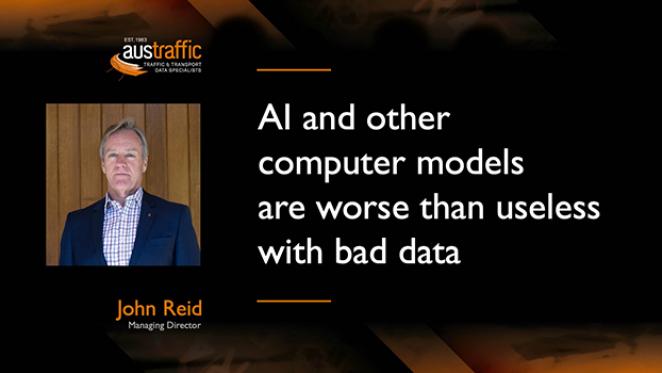The “Data Insights, Analytics and Visualisations” session that was part of the AITPM 2021 National Conference produced some very positive comments about how there is much more data around but we need to get better at collecting, analysing and using data for all that it is worth. But we still have a long way to go.
The session was questions-and-answers based on pre-prepared presentations that were made available for perusal prior to the event.
We produced the following video “AI and other computer models are worse than useless with bad data”. The video is not just our thoughts but includes comments from some of the most progressive leaders in the transport profession.
From John Reid, Managing Director of Austraffic and very proud life member of AITPM and a Past National President:
"Having now served Austraffic clients for some 38 years, I am frequently discouraged by a lack of awareness and often concern about scoping what data should be collected and how data is collected. Is it fit for purpose and the significance of the need to check the quality.
Data requires context.
A volume of traffic is only meaningful if we know when and under what conditions (including surrounding activities) are happening at the time: COVID has shown us that. The quest to reduce costs is being applied in every area, but with data, a cheap approach leads to many ongoing costs. Artificial intelligence will only accelerate the problems where bad data becomes bad conclusions - only now at an even faster rate.
While we may have new sources of data providing many records, we must test to see that we are recording the diversity of experience and then not to average out all the complexity of the real-world situations. We need to understand the reasons why people are travelling if we are to project the future.
We must instill an expectation and a reality for post-project auditing.
All the theories in the world are useless unless we measure what are the resultant changes, not just soon after an event, program, or project, but also to identify the long-term, changing, trends.
We conclude, not with a few strategic buzz words but specific actions, such as measuring the time spent getting data and coping with limited or bad data.
The cost to the community and our profession necessitates an intense drive to make data as strong as it should be because it is the foundation of our ideals and recommendations.
The presentation is designed to stimulate your thoughts on data."

